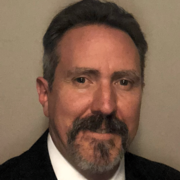Shawn Miller, Technical Director, Civil Space and Weather, Raytheon

Please describe your educational background and what sparked your interest in atmospheric or related sciences.
I majored in Aerospace Engineering Sciences at the University of Colorado, Boulder, graduating with a BS in 1991. In the first semester of my senior year, I took a class on satellite remote sensing, and decided I wanted to pursue graduate work in that area. My professor for that class was an oceanographer and ran the remote sensing department, so I took a class on oceanography my last semester of undergraduate studies. At that point I knew I was hooked and I was able to enter the graduate program in Astrodynamics and Remote Sensing. Because of my now-advisor's focus and ties with the science community, I had the opportunity to learn about meteorology from a satellite perspective, leading into courses on radiative transfer and atmospheric physics, which I really enjoyed. That culminated in my PhD thesis on remote sensing of precipitation.
What was your first job in the field and how did you end up in the job you are in now?
My first job after receiving my PhD was a postdoctoral assignment at the Cooperative Institute for Climate Studies at the University of Maryland in College Park. I continued my work on remote sensing of precipitation there, working with folks at NOAA in that regard. I was getting set to join NOAA based on that work, but then Raytheon (formerly Hughes) was hiring several positions to support the early development of algorithms and instrument design for the Visible Infrared Imager Radiometer Suite (VIIRS). There are now two operational VIIRS instruments on orbit, which is very rewarding to see from a personal perspective. From there, I worked in various aspects of satellite remote sensing and weather, including algorithm development, instrument design, ground system design, and eventually weather decision support. That's how I ended up being a Technical Director for my current role.
What opportunities did you pursue that you knew would be beneficial to securing a job in the profession?
Outside of my core research work at the University of Colorado, I think it was important for me to attend a few key conferences on remote sensing of precipitation. I got to meet the leaders in the field that way, and by participating in more than one event, that led to recognition and the development of new relationships. When it came time to graduate, one of those relationships turned into my postdoc opportunity.
What other courses/skills beyond the required math and science courses do you think would be the most helpful to individuals wanting a career in your profession?
I think the most important thing for any scientist or engineer to learn, outside of math and science, is how to communicate, both verbally and in writing. It's the way the things we do get better integrated into full solutions and into the greater good of society. It's also critical for securing the continued backing and funding of the things you want to accomplish. Once you get to a certain level, you're using PowerPoint more than any other tool, and communication is key to everything.
What is your typical day on the job like?
As a Technical Director, my job is to continually look into the future at new business opportunities, identify what we might want to pursue based on what we do today, and determine if and how we develop new capabilities to help with those pursuits. So I spend a lot of time in meetings (often virtual) coordinating with our business development folks and leadership to refine our technological plan forward. That involves a lot of PowerPoint, and sometimes Excel to help keep things organized and quantified. I also travel quite a bit, usually for a couple of days at a time, and sometimes every week of the month, to coordinate in person with my coworkers and meet with customers.
What do you like most about your job? What is the most challenging thing about your job?
I like learning something new every day, and I also like the process of developing and evolving a big-picture plan for where we want to go with our capabilities and technology. I like the people I work with as well; we all have a passion for the weather and environmental missions at NASA, NOAA, and Air Force Weather. The most challenging thing is also the most critical: communication. We're always trying to find ways to be better at that.
Does your job allow for a good work/life balance? If not, why?
Yes, but that has required a conscious decision on my part to draw a line. It is expected, and rightly so, that we occasionally have to work extra hours to get the job done. But I also do everything I can to make sure my free time is truly free time, whether that's nights, weekends, or vacations. That's not only good for me, but it's good for the company because it keeps me refreshed and able to perform better on the job.
Over the course of your career what is the most exciting thing that has happened to you?
Being named a Fellow of the AMS - seeing the company that I joined there was extremely rewarding and humbling.
Is there anything you wish you had done differently in your career?
No - I am happy with where I am. If I'd done something differently, it might have made some things better, but then other good things also probably wouldn't have happened.
What are some "must haves" on a resume if a person wants to gain employment in your field?
Everybody that applies typically has the technical credentials. The resumes that jump out at me are the ones that show an ability to lead and work with teams to achieve a common goal. A well-written and organized resume also indicates a strength in the ability to communicate, which is crucial.